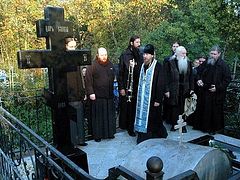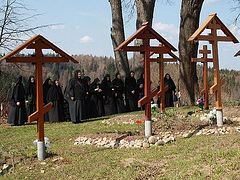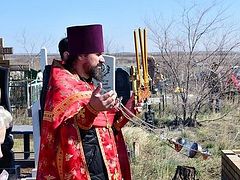Christ is Risen, dear brothers and sisters! Today is the first Paschal day when the Church prays publicly for the departed. We have come to church to pray for our reposed relatives, and this commemoration is special.
Throughout the year, we worry about them, remember them, mourn and grieve. But it is no coincidence that this Paschal Service is called Radonitsa (meaning “rejoicing” in Russian): this word indicates that we rejoice. The Church calls on us to share this joy with our departed relatives, with those whom we loved and cherished, who were important to us throughout our lives and remain so to this day.
Bright Week has passed. It has flown by like a single Paschal day: the time when we were called to rejoice in our salvation, in what the Lord has done for us. The Church is the one Body of Christ. And although there is a relative division into the Church Militant (earthly) and the Church Triumphant (Heavenly), we understand that this is all one Church, of which Christ is the Head; and It is quickened by the Spirit of God. We believe that the Lord gives Paschal joy to those who have already crossed the threshold of eternity.
What is revealed in the Kingdom of God to our departed relatives, what they see, hear, and feel, is undoubtedly incomparable with what we experience, since they are no longer limited by their flesh—by this coarse earthly nature (cf. 2 Cor. 12:4). But the question is: to what extent do they experience all this as joy? Are they in a state of bliss and do they really rejoice? From everyday experience we know that when someone who is in difficult, deplorable circumstances hears, say, amusement and joy in a neighboring house or apartment, he can react to this in different ways. Is he truly happy for his neighbor? Isn’t he envious, angry, or annoyed just because joy is passing him by? Of course, it is a very relative comparison with what may be happening in eternity.
But by the grace of God, the Church that consists of people living on earth, through conciliar prayer, through charitable acts, as if by the hands of our departed close ones, for whom we pray and whom we love, intercedes with the Lord, asking, begging Him to forgive the sins of the departed and to vouchsafe them to partake of ineffable Paschal joy. The joy that each one of us longs for and that we speak about with our hearts in the Creed: “Whose Kingdom shall have no end.”
Let’s ask ourselves: When does a person rejoice? Can there be joy without a reason? No, you can only rejoice in what you have: you can’t force yourself to be happy with what you don’t have. And therefore, if our hearts rejoice at Pascha, this is the most powerful evidence that the Lord is living and the gift of His grace is in our hearts. But joy also comes from something else. Ask a small child (except ye… become as little children, ye shall not enter into the Kingdom of Heaven [Mt. 18:3]) when he rejoices. He rejoices when his desires are fulfilled—that is, he is happy and blissful. A child wants ice-cream—his mother buys him ice-cream, so he is glad. In other words, we rejoice when our will has been fulfilled.
And if we rejoice at Pascha, this speaks volumes. It means that our will has become subordinated to the will of God. What else should we look for in life? Where there is God, where there is Truth, there is true joy. Of course, everything else can please and gladden us, but the longer we live, the more we realize that all this joy is very short–term and momentary, like a flash of lightning. But the truth of the Lord and His joy are never-ending.
And that is why today we believe that not only we, but also those for whom we pray, partake of this joy. And, most importantly, together with them we feel that we are one Body of the Church of Christ.
If we read the memorial prayers carefully, we will definitely find words saying that sooner or later everyone will have to stand before the Lord, give an answer for the life he lived, and hear His judgment about our eternal destiny—either Paradise or hell. And if there is no joy in the heart of a person who stands before Christ, then he will not have the courage to say two simple words, without which our salvation is impossible: “Lord have mercy!” Only the joy in the Risen Christ in our hearts gives us the courage to beg the Lord for the gift of salvation, because it is given exclusively by the grace of Christ.
Today’s Gospel passage attunes us to perceiving life in a special way. Christ says that non-believers cannot be saved because they loved darkness (Jn. 3:19). These are simple words and, at first glance, everything is clear. But it should be noted that the emphasis here is on the word “loved”. Darkness is a place where there is no God and nothing connected with Him exists there. It’s one thing to be in such darkness, but it’s another thing to love it.
Everything that the Church does for us and tries to teach us within the framework of our earthly lives is aimed at one thing: that we would not love darkness, but hate it. As soon as this happens, we have love for the Lord.
Dear brothers and sisters, on this holy feast I would like to wish all of us to remember the important words of Christ, that he that believeth not is condemned already (Jn. 3:18). After all, these are very frightening words. It is better for us to be believers, to work our salvation, to hate darkness and love God. Then in eternity, when we hear this victorious, triumphant cry, “Christ is Risen!”, which we love so much here on earth, it will arouse an inexpressible storm of joy and bliss in us. Amen.
Christ is truly risen!




